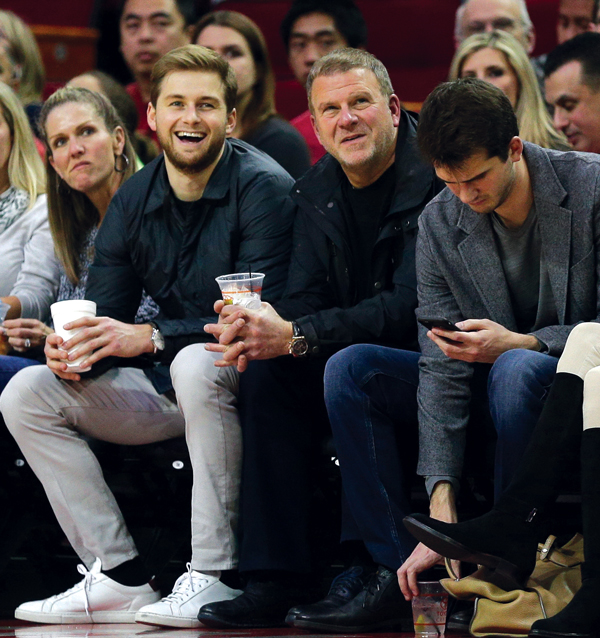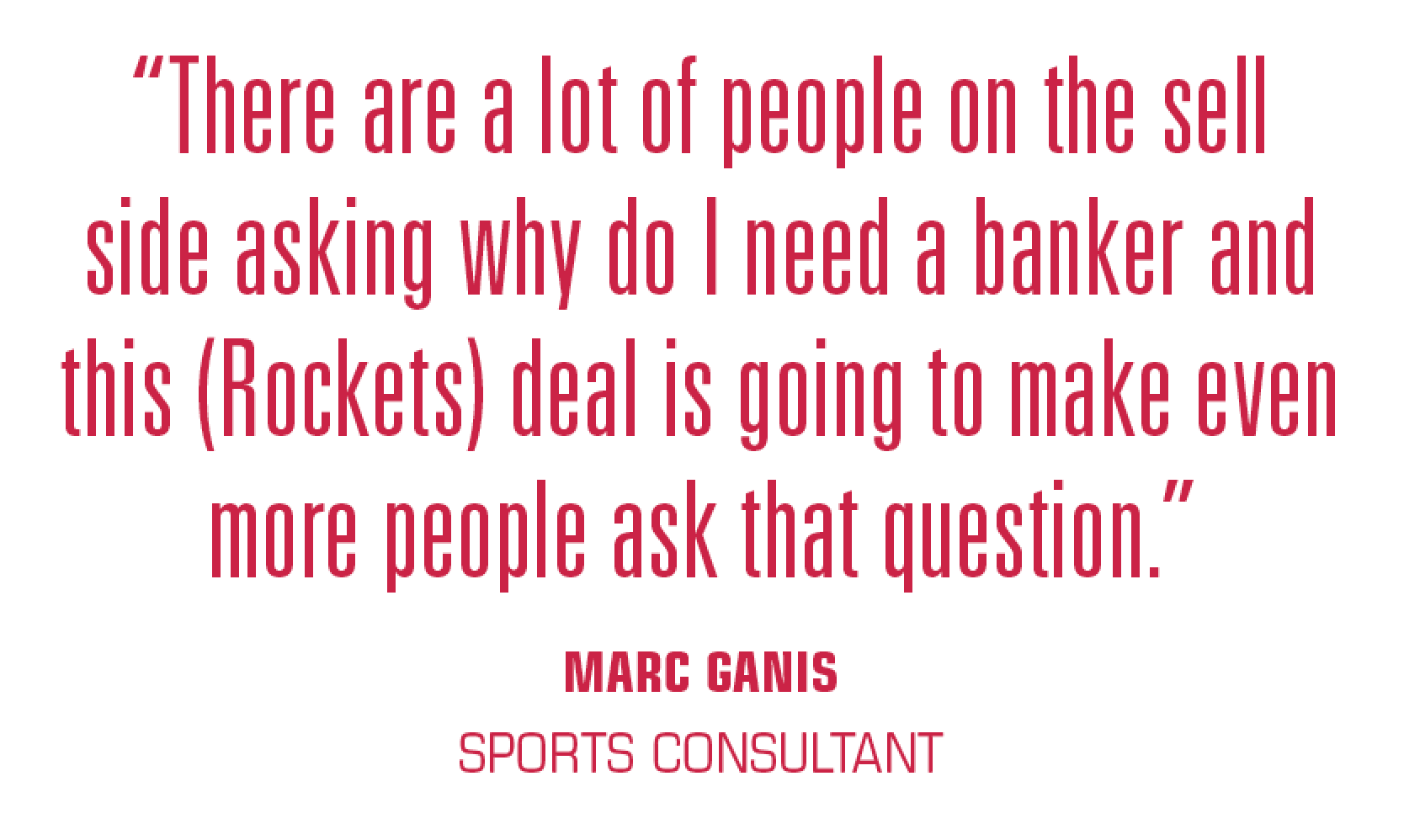 |
The Houston Rockets needed only 50 days to lock down a buyer, Tilman Fertitta, who offered a record $2.2 billion for the franchise.
GETTY IMAGES |
Is the sports team investment banking business in trouble?
In the last month, the Houston Rockets and the Miami Marlins were sold for a combined $3.4 billion, and in each case the club handled the process on its own and without a banker. Even on the buy side, traditional advisers were not deployed by either pending purchaser.
Rockets owner Les Alexander took only 50 days to find a buyer at a record price of $2.2 billion in a deal that was also aided by team CEO Tad Brown. The Marlins struggled through their process, which was led by team President David Samson. Still, in both cases, prices were boosted by the lack of teams for sale, and the higher prices in turn made for a smaller pool of possible buyers, negating the need for bankers’ robust Rolodexes. As a result, other teams that go on the market may follow the path of the Rockets and Marlins.
“There are a lot of people on the sell side asking why do I need a banker and this deal is going to make even more people ask that question,” said sports consultant Marc Ganis, of the sale of the Rockets to Houston-based billionaire restaurateur Tilman Fertitta. “If you are an individual owner selling a club, you have to look at the Rockets. There are only a small universe of buyers. You have to ask yourself why you would use a banker.”
If teams begin to turn from using mergers and acquisitions advisers, ironically it would return sports to the period before the space became big business. Back then, teams might issue a press release or put a notice in the newspaper, and then hope a wealthy local noticed.
That began to change in the 1990s when the business started to take off. League rules became more complicated and required experts who could navigate clients through what has become a regulatory thicket. By the early 2000s big banks entered the space, and soon many of the executives in charge of those practices spun off into their own boutique firms. Commissions for the banks are usually a few percentage points of the total deal.
The Marlins make a greater case for going it alone because they fetched a premium price even though their financial picture is bleak. The Rockets are one of the top-regarded teams in the NBA and play in a major market. The Marlins are big money losers and their ownership was not popular in the fickle fan market. Yet assuming the deal clears MLB scrutiny, the $1.2 billion price tag is far higher than outside bankers had thought possible.
First Look podcast, with team sales discussion beginning a the 20:30 mark:
“I will be keeping my eye on the market. Trust me, it is not lost on me that teams are being sold without representation,” said sports investment banker Sal Galatioto.
That’s not to say there’s no business for advisers like Galatioto. He is advising on the sale of minority shares in the Los Angeles Dodgers, and like many of his ilk, is working overseas where deals can often get more complicated.
And there are always deals like the Brooklyn Nets, who for years have been trying to sell a part of the team. The stake does not include an interest in the team’s arena, but may include a path to controlling ownership of the money-losing franchise, so it is not an easy transaction. Allen & Co. is the current incumbent investment bank, taking over for Evercore.
WHO HANDLED THE DEALS
Houston Rockets
■ Sale price: $2.2 billion
■ Sell side: Les Alexander, owner; Tad Brown, CEO
■ Buy side: Tilman Fertitta
Miami Marlins
■ Sale price: $1.2 billion
■ Sell side: Jeffrey Loria, owner; David Samson, president
■ Buy side: Derek Jeter and Bruce Sherman; Jeter advised by Greg Fleming, formerly with Morgan Stanley
Bob Caporale is somewhat of the grandfather of the sports investment banking business, having started Game Plan LLC in 1994 when the sports business was still largely mom-and-pop operations. He considered the Marlins and Rockets deals getting done back to back without an adviser more coincidental than trend.
“Everything in the Marlins was goofy,” he said. And Fertitta, a former Rockets minority stakeholder, is well known to seller Alexander, Caporale pointed out.
Alexander essentially sold the team the way they were sold before Caporale came along: make an announcement the club is for sale and wait for the bids to flow in. When teams began to lose money, and prices began to rise, finding the right buyer often required a financial adviser. Now, many teams are thriving so owners are less apt to sell. That helps grease prices skyward, shrinking the pool of buyers.
“Les really did a perfect job,” said George Postolos, former president of the Rockets who now runs The Postolos Group sports advisory firm, of the Rockets owners. “He trusted his own judgement about the value of the team and no one was going to tell him what it was worth.”
The process brought multiple bidders offering at least $2 billion, with Fertitta submitting the winning bid of $2.2 billion. NBA owners must still vote on whether to approve the Rockets sale.
The Marlins process was the inverse, stretching over nearly a year with different groups coming in and out. In the end, the offer fronted by Derek Jeter won the bid. Jeter used a longtime financial adviser from Morgan Stanley, Greg Fleming, for counsel.
Given the complexity of the Jeter bid, which includes debt, preferred equity and many limited-partner stakes, some financial insiders are unsure it will pass MLB muster.
“Let’s see if the Marlins sale closes,” said Caporale, who lives in Miami. “I am still not 100 percent convinced.”
If the Marlins bid does fall apart, it could underscore the need to use advisers to vet would-be owners. But if the deal holds, the message to owners may be that whether it is an easy sale like the Rockets or a tough one like the Marlins, demand is so high for clubs that investment banks are unnecessary.





